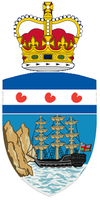Monarchy of the South Sea Islands

| ||||
| Role: | Head of State | |||
| Function: | Ceremonial | |||
| Style: | Their Royal Majesty | |||
| Last: | Gabrielle I | |||
The Monarchy of the South Sea Islands is the constitutional form of government by which the President of the Republic of Mercury serves as Head of State of the South Sea Islands. The current monarch is Her Royal Majesty Queen Caroline I. A largely ceremonial role based on the Mercury and the South Sea Islands' shared historical connections with Nova England.
History
Due to the intertwined histories of the South Sea Islands and Nova England as the shared successors to the the Britannic Empire, the hereditary monarch of Nova England reigned as the ceremonial monarch of the South Sea Islands from the foundation of the Commonwealth in 1501 AN, up until the collapse of the Nova English state.
While the last monarch of Nova England, King Josephus I, was rescued during the collapse of his Kingdom and brought to the South Sea Islands in 1699 AN, His Majesty ultimately chose to abdicate the throne in 1702 AN. The stated reason was the desire of His Majesty to devote his undivided attention to regaining his throne.
For that reason, the Government of the South Sea Islands resolved to invite the President of Mercury to assume the throne on a ceremonial basis as of 1702 AN.
Monarchs
The monarchs of the South Sea Islands are listed below, in chronological order
Role
The role of monarch of the South Sea Islands is largely ceremonial, with the monarch playing no role in the day-to-day governance of the Commonwealth. The key function of the monarch is the appointment of the Lieutenant Governor, who nominally exercises Executive power in the territory on behalf of the monarchy.
Although the monarch ceremonial appoints the Lieutenant Governor, they do so based on the recommendation of the Legislative Assembly, and the appointment is considered a formality.
Republic of Mercury
The monarch of the South Sea Islands is appointed based on the elections for President in the Republic of Mercury. As soon as possible after the swearing in of a Mercurian President, the Ambassador of the South Sea Islands to Mercury will request a meeting with the newly installed President.
In a low-key private ceremony, the newly elected President is asked to take the royal oath and installed as the monarch of the South Sea Islands.
Although Mercury and the South Sea Islands share a Head of State thereafter, the two nations do not have any obligations to each other beyond those established by international treaties, such as the Xäiville Convention.






